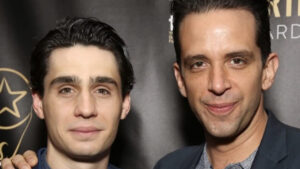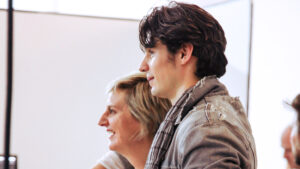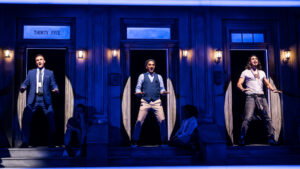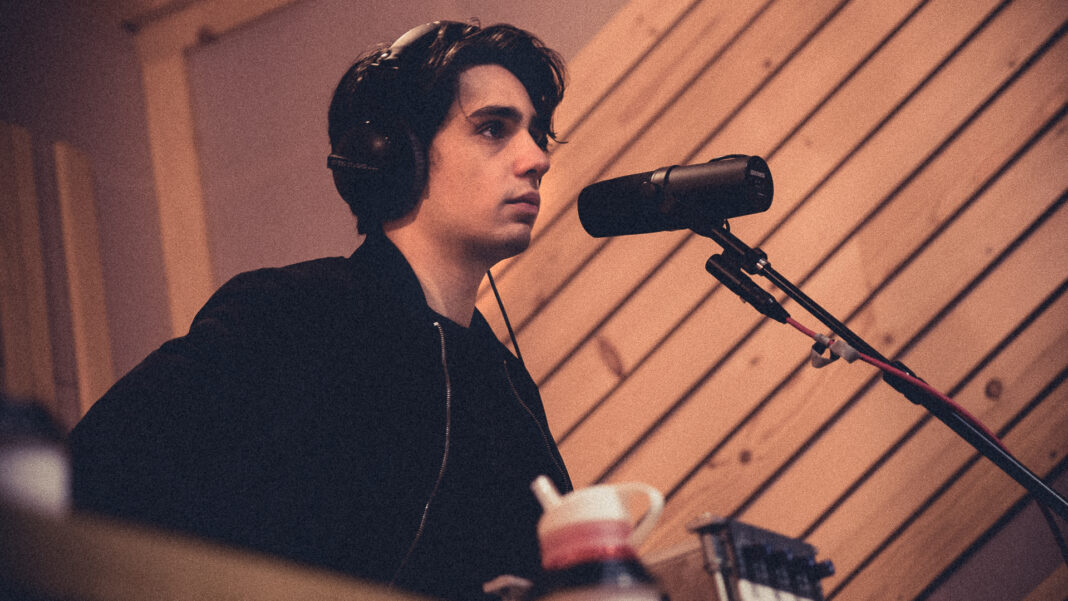
Life is a roller-coaster of a ride. Just ask Bobby Conte. The actor/singer has appeared on Broadway in A Bronx Tale where his mentor and friend was Nick Cordero, the actor who passed away due to COVID in 2020. He recently appeared in the revival of the musical Company as P.J. That musical was written by Stephen Sondheim who passed away a week after the first preview once the show was able to return after Broadway started to re-emerge from the pandemic.
Conte is not one to sit around waiting for something to do. In 2020 he released a solo album entitled Along the Way. It’s a mix of Broadway, pop and standards that was born out of a cabaret act he started writing in 2015 and had started performing.
On August 15th, Conte will be performing a revised version of his original cabaret show at Birdland in New York. Those revisions reflecting the incredibles highs and lows he’s been experiencing. But through it all he’s taken everything in stride and maintained a tremendous sense of gratitude. As you’ll see in this interview.
What follows are excerpts from our conversation earlier this week that have been edited for length and clarity. To watch the interview, please go to our YouTube channel.
The album came out two years ago. How has your personal journey mirrored or diverged from the one you sing about on the record in the two years since its release?

It’s a great question. The more time that goes on I’m able to look at it more with a bit more perspective. The context of the show and of the album is that it’s charting three specific relationships in my life. The dynamic of one of those relationships has significantly changed since the pandemic. So in re-writing the show a bit for Birdland, I had to do some editing to see how that relationship has evolved.
One of the songs has changed: in the place of Love to Me [from The Light in the Piazza] I’m now putting in What Can You Lose? from Dick Tracy that Stephen Sondheim wrote. For a very practical reason, it’s important when I tour this show to have a song from A Bronx Tale and I have a song from Company.
Really, the big thing is that Nick had died. Nick left before I was ready to say goodbye to him. It’s all very odd. It’s a little overwhelming to think about every now and then when the reality hits. So that’s how the show is a bit evolved and changed over the past two years.
Do you feel like you’ve been confronted with a lot of this a lot sooner than you thought you would be?
I start this show by singing Blame It on My Youth to try to acknowledge to the audience right away that I’m aware that I know nothing in the grand scheme of things. It doesn’t make my feelings and my experiences insignificant, but there’s a lot more life to live. You can move on to the next chapter with that sort of sigh of relief in your breath to say there’s so much more awaiting you.
Within this album there’s a song from Pasek and Paul’s song cycle Edges. There are also songs from Anyone Can Whistle, The Light in the Piazza, the aborted Honeymooners musical and also She Loves Me. Does the selection of those songs not only give us an idea of your perspective of relationships, but also the kind of shows or perhaps the specific shows you would like to do in the future?
The list I have of dream roles is endless. So yes, those are some. But that’s just the tip of the iceberg. Because I’m such a nerd with this there would be an endless number of them that I’ve read and I fall in love with over the years that I would love to do. It’s more that the lyrics of those songs served a specific function in a story I wanted to tell.
I also love digging into these composers now that we know so well and really have hit the zeitgeist. They’re really figuring out who they were when they were trying to figure themselves out in a way. The show very much is about a young person trying to figure out who he is as he’s entering a more adult world. So it seemed to have just fit better in that context. But yes, you’re not wrong and, digging deeper into it, maybe this show is a bit of the musical interests that I have.
What have you learned yourself about yourself as a performer during the multi-year journey of Company?

I’ve learned that I have totally given over to the Marianne Elliott mindset of what theater is supposed to do. When you are dealing with entities that are so beloved and have been held on a pedestal by many people for so long, your way to honor that legacy, and that the annals of history that you’re now entering, is to do an unapologetic, unabashed take that’s in service of the writer and in service of the original intention of those people, but make it palatable and accessible for an audience who has never seen the show before or perhaps have never been to the theater before.
If we don’t engage that kind of audience, then our art form is going to die on the vine. So I’ve stepped more away from my sort of purist mindset in the musical theater and that’s what I learned.
Your answer reminds me of the lyric from Move On in Sunday in the Park with George. “Anything you do, let it come from you. Then it will be new.” That’s a lesson we can all learn. I think that whole song is a masterclass in lessons we can learn.
I think there was some interview years ago [with] James Lapine [bookwriter and director of Sunday in the Park with George original production] and it was when the revival had come back that used all that computer digital animation [2008]. They were looking back at the lyrics and I think James said, “It’s like we wrote ourselves a message in a bottle.” It’s this thing that we can always come back to when you’re in the pits of despair or in writer’s block or just not figuring out what’s the point of doing anything in the first place. Do I have anything of value to even put out in the world? Especially when you could think it doesn’t matter what we put out into the world because we’re so insignificant.
Have you have you seen these amazing pictures that NASA came out with a couple of weeks ago? If that doesn’t give you perspective or make you feel so meaningless, I don’t know what does. But yet it’s our job to find meaning in whatever our actions are, even if in the grand scheme of things it doesn’t matter or as I would say in A Bronx Tale all the time, “like nobody cares.” But just because nobody cares, it doesn’t mean that you don’t have to find meaning and purpose in what you do in your daily life or else you’re just wandering aimlessly.
Earlier this year I had the privilege of having a conversation with Matt Doyle about his experiences in Company and he told me that Sondheim was around a lot for rehearsals. Can you tell me about your experiences with him?

So the first time he came in we were running You Could Drive a Person Crazy. We were figuring out what those ad libs were before Manu [Narayan – “Theo”] starts singing “When a person’s personality is personable.” They used to be very explicit. They used to be very biting and it was a little intense and overwhelming. So we didn’t pick them up, but we made it more palatable language.
I remember just in the moment going, “What are you so afraid of” and then going back and doing the fun choreography. That made him burst into laughter, which I will always remember.
He came to the first preview and then held court at the back of the theater for a couple hours. More times than not I’m a pretty private person. When I’m around people that I respect so much and intimidate me, in some ways your job, I’ve learned, is to shut your mouth and open your ears. I was just listening as intently as I could. There were definitely questions I wanted to ask. But I thought I’ll see him at opening or I’ll see him in other contexts, it’ll be fine. Then sadly he passed a week later. So it’s not too dissimilar to Nick. It’s continuous examples of when you are fortunate enough to have the people you love around you, you should make as full a memory and as full an experience as you can with these individuals while they’re still here.
So what would you have asked him?
Well the rumor, I think even Matt had told me back during the pre-pandemic, was that PJ and Theo were names of ex-boyfriends of Steve’s and that’s where they got the names for these boyfriends. So I wanted to go up to him and say, “Can you tell me who P.J. was?”
You were on quite an emotional whirlwind with this show: not being able to open on Sondheim’s 90 birthday, having the pandemic happen, re-opening, Sondheim passing. I guess the bright spot was that you got to perform the show and then the acknowledgment Company received at the Tony Awards. Given how emotional this whole experience had to have been for you, to use one of the songs from from your album, does time heal everything?
Absolutely it does. I’ve always viewed that song in the context of relationships, but I have no doubt it can relate to the context of being in a workplace. But I don’t know, man. There are undeniably some sorry and grateful aspects to the whole experience. That was many of our favorite songs backstage that we would hear every night. But I’m a person that, just to find some sort of sanity in a world that has no control; when you and I have to exist in the art, entertainment, artistic world, where if wanted control of our lives, we’d go be accountants elsewhere, I know I need to choose gratitude when the pendulum swings at the end of the day – even in these hard situations.
We were one of the shows that got to come back after this pandemic. We had many colleagues for whom that was not the case. Even though Steve died, he got to see our show as the last piece that he had written on Broadway in this new context. He adored it and was lauding it and wanted his work to be seen in an ephemeral, malleable context, because that’s what theater is in many ways. What a blessing that is that then I got to work with the dream team of theater monsters and the American musical theater for even for these nine months, even if it was over the span of three years. I choose to look at it in that way.
In a 2017 Stephen Sondheim interview that Lin-Manuel Miranda did, Sondheim said, “It stimulates you to do things you haven’t done before. The whole thing is if you know where you’re going, you’ve gone, as the poet says, and that’s death.” Once this Birdland show is over and behind you and with Company behind you, what would you like to do that you haven’t done before?

There’s an endless number of things. But what I’ve learned a bit more – and I’ve been now in the city for up to eight years soon – is to give in to the unknown. To give in to the silence or the quiet space or the hesitancy is a good thing because Company, A Bronx Tale, funnily enough, came from that space. I was leading a full creative daily life. That’s what I try to do every day – find things within my control to service that and the instinct within me.
The easiest way to do that is to make material of your own, to build a show like I’m doing at Birdland. Then I’ll tour across the country. That’s the easiest way to fulfill that because I’m not reliant on other people giving me that opportunity. But when these opportunities like A Bronx Tale and Company fall in your lap, it’s because I have wonderful people that work for me to get me in those doors. But it’s serendipity, it’s luck, it’s total happenstance or law of attraction or whatever you want to say. My job is just to meet that with diligence, non-complacent hard work. So all I do is continue putting in that hard work and then seeing what serendipitous things happen to land in my lap.
Bobby Conte will be taking his show around the country. We will update you when dates are announced.
To see our interview with Bobby Conte, please go here.
Main Photo: Bobby Conte (Courtesy of the Artist)











